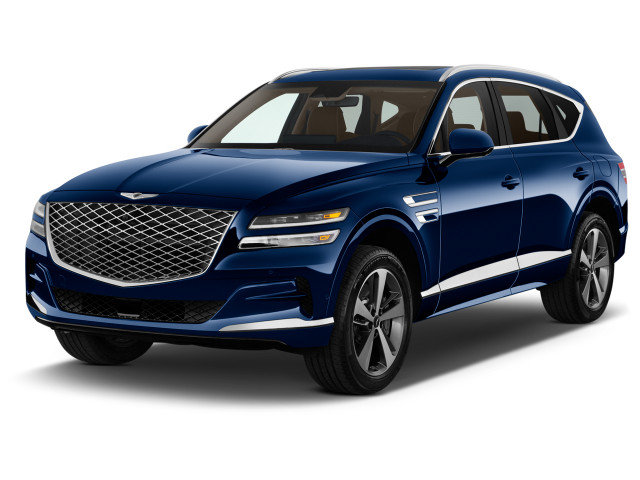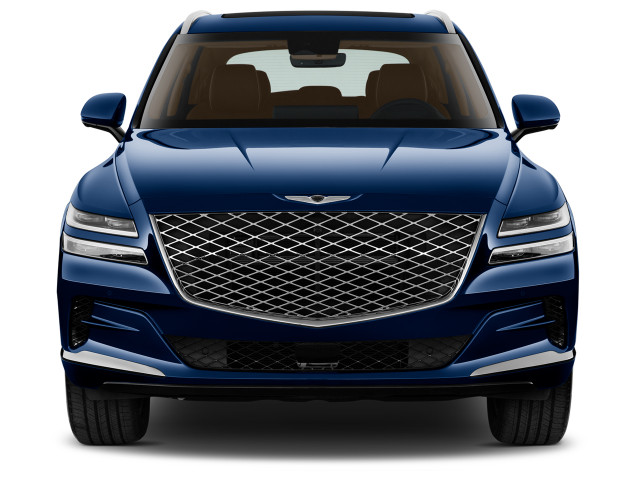LIKES
- Lithe body
- Stunning cabin
- Supremely quiet
- Roomy rear seats
- Attention to detail
DISLIKES
- Two console dials—which one’s right?
- Genesis no longer the “value” luxury play
- Infernal spin-and-click infotainment inputs
- It’s big and thirsty in V-6 spec
BUYING TIP
The sublime exterior and stellar interior of the 2022 Genesis GV80 could pass for an ultra-luxury marque; a few handling tweaks would seal that deal.
What kind of vehicle is the 2022 Genesis GV80? What does it compare to?
The GV80 is Genesis’ bigger crossover; it was its first, followed last year by the smaller GV70. With seating for up to seven people, the GV80 rivals vehicles like the Audi Q7 and Q8, the BMW X5, and the Mercedes-Benz GLE.
Is the 2022 Genesis GV80 a good SUV?
It’s gorgeous, spacious, strong and silent, with a sumptuous interior and a stellar warranty. It’s nice, in other words. We give it a TCC Rating of 7.8 out of 10.
What's new for the 2022 Genesis GV80?
This year the GV80 adds a Prestige Signature version with 6-way power bucket seats in the second row, as well as new paint colors.
The base GV80 can shuttle to 60 mph in about six seconds, thanks to its 300-hp turbo-4 and rear- or all-wheel-drive setup. The 375-hp twin-turbo V-6 version trims a half-second or more from that time, but it’s heavy and has some turbo lag to spoil the launch party.
Ride rates more highly than handling in the GV80. Even with its adaptive suspension, its massive wheels can translate small bumps into the cabin, while its heft contributes to lean in corners. It’s quiet and comfortable, in the classic luxury-car mode.
So’s the interior, which wears synthetic leather in base spec over its front heated power seats. Upgraded versions can have heating and cooling, nappa leather, 16-way adjustment with side bolsters that puff up when the car’s set to Sport mode, and even a vestigial third-row seat, for those who think they really need one. The selling point here isn’t space, though it’s very good at that: it’s top-drawer fit and finish that could easily swap in for the drab cabins we’ve occupied in more pricey SUVs.
Both the IIHS and NHTSA think highly of the GV80, by the way, and all versions have automatic emergency braking, active lane control that tends to wander between the lines, and blind-spot monitors.
How much does the 2022 Genesis GV80 cost?
At least $51,295 for a GV80 with the turbo-4, rear-wheel drive, 19-inch wheels, a 14.5-inch touchscreen, and Apple CarPlay and Android Auto. We like the twin-turbo V-6 version in $69,095 Advanced spec, with its cooled front seats and wood trim; the over-the-top Prestige Signature edition will set you back $78,295 but comes with 21-speaker Lexicon audio, nappa leather seats, and twin second-row buckets.
Where is the 2022 Genesis GV80 made?
In Ulsan, South Korea.
Styling
The GV80 has the stance to match its dance.
Is the Genesis GV80 a good-looking car?
It’s handsome from every angle. We quibble on the deeper meaning of some details—like the light-striped front end—but there’s no arguing its essential goodness. It’s a 10 here.
The GV80 stands out without looking as if it’s trying too hard. The huge crest-shaped grille wears well on its taller nose than it does on the G80 and G90 sedans. Those banded LED headlights wrap around the GV80’s fenders, stitching the belt line in line with its taillights. The rear roofline mimics BMW cues without aping them. Those details win, but it’s the proportions that give them the platform: the GV80 has a sport-wagon shape, with a dipped roofline and lightly chromed details from its rocker panels to its tailpipes.
Performance
The GV80 positively flies with twin-turbo V-6 power.
There’s not yet a high-performance flagship model, but the 2022 GV80 does fine with its duo of turbo-4 and twin-turbo V-6 engines. (In the wings: the electric GV60, of course.) It’s a robust performer in either guise, with a balanced rear-drive feel in less thrusty turbo-4 versions offset by the quicker but heftier V-6 edition. We give it a point each for its powertrains and its handling, for a 7 here.
Is the Genesis GV80 4WD?
Turbo-4 SUVs get rear-wheel drive, with available all-wheel drive that can ship power from the back treads to the front when it senses slip.
With the standard 2.5T specification, the GV80’s 300-hp 2.5-liter turbo-4 twists out 311 lb-ft of torque and sends it through an 8-speed automatic, with some driver-adjustable modes to toggle throttle and steering feel through comfort to sport modes.
The GV80 is sluggish off the line, especially when the GV80 is in its higher weight class—about 4,850 lb in all-wheel-drive form, versus 4,500 in base rear-wheel-drive form. It can be noisy under full throttle, and acceleration is ample but not zingy or overwhelming here; tap the transmission’s shift paddles and the turbo-4 edition can pass without much strain.
Quieter, more potent, and more refined, the 375-hp 3.5-liter twin-turbo V-6 edition churns out 391 lb-ft of torque, but can weigh as much as 5,100 lb. That takes some of the edge off its horsepower advantage, as does an initial dose of turbo lag. With active noise cancellation to take the edge off random powertrain sounds, it rushes and thrusts its way forward to a 0-60 mph time of about six seconds, though it’s better left in Sport mode to stave off that very low-end torque drought.
Power’s good in either GV80; ride and handling are competitive, but don’t rise to the top tier, not with the X5 and GLE lurking in this set. The GV80’s heft makes itself known as it leans into turns, but it’s also set up with a steady-state firmness that lets small bumps intrude on its otherwise serene driving experience. Steering sensations are limited to weight that builds up right off-center and doesn’t vary much; it lacks the nuanced feedback we’ve felt in an X5.
That said, we’ve not driven the base setup with its multi-link steel suspension, though—only versions with the high-tech adaptive suspension that uses cameras to gauge the road condition and adjust the car’s damping accordingly. With it and massive 22-inch wheels, it’s understandable why the GV80 doesn’t offer a master class in communication; the 2.5T’s more pedestrian setup and 20-inch wheels might be a better choice.
Comfort & Quality
The GV80 envelops passengers in a plush cabin for up to seven people.
The GV80’s a smooth operator, thanks to a cabin that’s flush with leather and wood and glints of bright trimwork. Those top-spec versions have flawless fit and finish, ample cargo room, and comfortable seats front and back, for a score of 10 here.
The GV80’s front seats have at least 12-way adjustment, with heating and synthetic leather trim, and especially good comfort. Spend a little more and the SUV gets 16-way leather seats with adjustable side bolsters and thigh extenders. The GV80 will pre-set a driving position based on weight and height you enter into its touchscreen, if you’re brave enough to do so.
In the second row, Genesis’ bench can seat three people and offers them almost 38 inches of leg room, but it’s better in the back with two abreast. The GV80 3.5T Advanced+ trim offers a very small third-row seat that’s good for very small people and very short trips; on the other end of the spectrum, a Prestige model with two second-row buckets can be configured, along with nappa leather, soft-close doors, and heating and cooling.
It’s easy to be swayed by the suede headliner in the Prestige GV80, or its suave open-pore wood trim, or its vast touchscreen interface. What’s even better is kept down low: the SUV’s active noise control blots out extra noise by producing inverse sound waves that cancel out bad frequencies.
Safety
The GV80 holds its own in a crash.
How safe is the Genesis GV80?
The GV80 has earned a Top Safety Pick+ award and the NHTSA’s five-star overall rating, though sub-tests showed four-star scores for front-impact protection. With its generous standard safety equipment, that gets it to an 8 here.
The GV80 sports standard automatic emergency braking, active lane control, adaptive cruise control, blind-spot monitors, and parking sensors.
Features
The GV80 leaves little on the luxury table.
The $51,295 GV80 offers a wealth of standard features, from 12-way heated power front seats to synthetic leather upholstery, 19-inch wheels, and 14.5-inch touchscreen with Apple CarPlay and Android Auto. Those each garner an extra point above average, as does its potential for upgrades. It gets one more for an excellent 5-year/60,000-mile warranty that includes 3 years/36,000 miles of free scheduled maintenance.
It’s an 8 here, since it’s dropped a point in value—all versions now cost more than $50,000—and since its infotainment could use some tweaking.
The turbo-4 offers one major upgrade: all-wheel drive costs $5,900. Or, you could simply swap into the 3.5-liter turbo V-6 model, which comes with all-wheel drive.
Our preferred pick would be that V-6 version in $69,095 Advanced trim, which gains wood trim, a sunroof, cooled seats, wireless smartphone charging, and a heated steering wheel.
How much is a fully loaded Genesis GV80?
The 3.5T V-6 AWD Prestige Signature costs a pause-generating $78,295. It’s a lot for Hyundai’s maiden effort in SUVs, but it does have 22-inch wheels, a sueded headliner, nappa leather seats, spectacular 21-speaker Lexicon audio, a 12.3-inch digital gauge cluster, and in the rear, a pair of heated and cooled power bucket seats with their own wireless smartphone charger.
The GV80’s infotainment offers lots of input paths, from voice commands to touchscreen inputs to its blasted rotary interface on the console. That shiny dial takes spins and clicks to locate its position for on-screen commands; it’s easy to confuse for the transmission dial. Voice commands work well enough, but not universally easily. The touchscreen is a long reach for short-armed and well-heeled drivers. We’ve counted five five different ways to change the GV80’s radio station—steering wheel, voice, touchscreen, console dial, or the simple tuner/volume control. It has more redundancy than a Boeing.
Fuel Economy
Gas mileage won’t deter most GV80 shoppers.
Is the Genesis GV80 good on gas?
It’s fine, for now. Genesis has electric vehicles coming in 2023—the GV80 doesn’t even come as a hybrid, so its best EPA ratings earn it a 4 here.
That model is the rear-drive SUV with the 2.5-liter turbo-4. The EPA pegs it at 21 mpg city, 25 highway, 23 combined. With all-wheel drive, it’s lowered to 22 mpg combined. The GV80 with the rorty 3.5-liter turbo V-6 and standard all-wheel drive manages just 18/23/20 mpg.



























0 comments:
Post a Comment